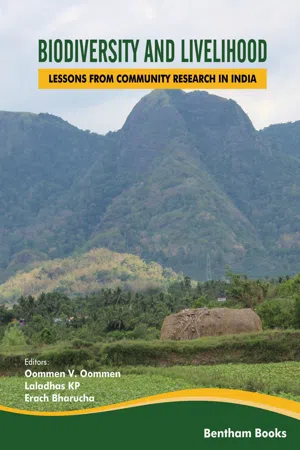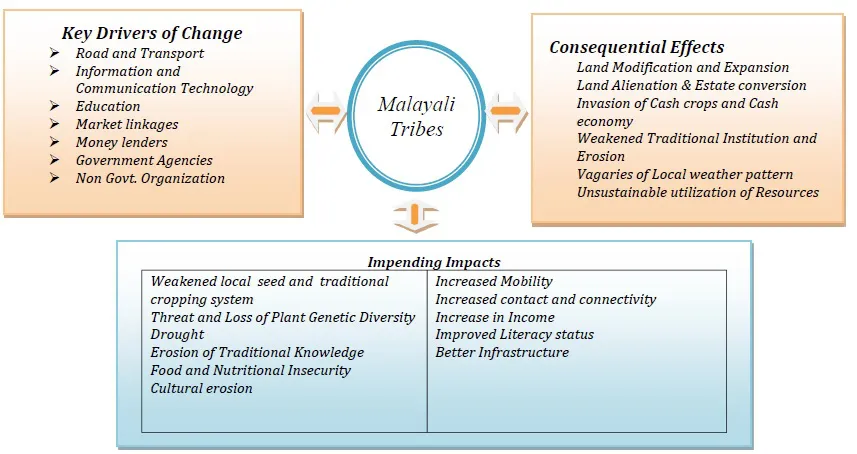
Biodiversity and Livelihood: Lessons from Community Research in India
- English
- ePUB (mobile friendly)
- Available on iOS & Android
Biodiversity and Livelihood: Lessons from Community Research in India
About this book
Biodiversity and Livelihood: Lessons from Community Research in India Is a compilation of research articles on the ecological biodiversity and local conservation efforts of selected regions in India, and among local communities throughout the county. 18 chapters have been contributed by experts in ecology, sustainability and ethnic studies in India. The chapters provide information on a wide range of tops which cover local communities, their agricultural practices and the ecological relationships between their community and the species on which their livelihood depends. Contributions emphasize different aspects of these topics, such as observational ecological information about the aforementioned regions and communities, the local biodiversity, tribal customs of ethnic communities that are linked to conservation, specific programs which are aimed at the conservation of specific plant and animal species endemic to the region, the benefits shared by the communities involved with conservation programs and recommendations shared by the authors for sustainable management of the regional ecosystem and its resources. Readers will find a wealth of information about biodiversity conservation in different regions in India (most notably the western and eastern ghats and provinces such as Kerala and Andhra Pradesh), from a basic and applied perspective. The book is, therefore, an informative reference for conservationists, ecologists, environmentalists and ethnologists who are studying the biodiversity and conservation of India. Readers involved in sustainable development programs in the region will also find the content valuable to their knowledge.
Frequently asked questions
- Essential is ideal for learners and professionals who enjoy exploring a wide range of subjects. Access the Essential Library with 800,000+ trusted titles and best-sellers across business, personal growth, and the humanities. Includes unlimited reading time and Standard Read Aloud voice.
- Complete: Perfect for advanced learners and researchers needing full, unrestricted access. Unlock 1.4M+ books across hundreds of subjects, including academic and specialized titles. The Complete Plan also includes advanced features like Premium Read Aloud and Research Assistant.
Please note we cannot support devices running on iOS 13 and Android 7 or earlier. Learn more about using the app.
Information
Traditional Ecological Knowledge, Dilapidated Ethno-Conservation Practices and Impending Impacts among Malayali Tribes of Kolli Hills, Eastern Ghats, India
Oliver King E.D. Israel*
Abstract
* Corresponding author Oliver King E.D. Israel: M.S.Swaminathan Research Foundation, 42 B2, President Venkat Rao Street, Gandhi Nagar, Mohanur Road, Namakkal – 637 001; E-mail:[email protected]
INTRODUCTION

Cultural Transitions, Agro biodiversity Impacts in Kolli Hills.
Table of contents
- Welcome
- Table of Content
- Title
- BENTHAM SCIENCE PUBLISHERS LTD.
- FOREWORD
- PREFACE
- List of Contributors
- Traditional Ecological Knowledge, Dilapidated Ethno-Conservation Practices and Impending Impacts among Malayali Tribes of Kolli Hills, Eastern Ghats, India
- Perception on Mushroom Ecology among Kattunaikka Tribes
- Biodiversity Based Benefit-Sharing Activities to Improve the Livelihood of the Local/Tribal Communities of India
- Biodiversity and Sustainable Utilization of the Genus Garcinia L. (Clusiaceae) of The Western Ghats
- Diversity and Utilisation of Wild Edible Fruits in Agasthyamala Biosphere Reserve
- Creating an Economic Stake in Conservation: A Case of Sustainable Fishery Resource Management from Godavari Mangrove Wetlands of Andhra Pradesh
- Economic Thoughts in Mainstreaming Biodiversity
- Concepts of Robustness and Ecosystem Health – with Case Studies from The Indian Context
- Climate Change and Its Impacts on Marine Fisheries and Livelihood: An Indian Perspective
- Integrated Approach for Developing Biologically Diversified Urban Landscapes @ TCS: A Success Story
- Interface Between Instruments of Development Planning and Biodiversity Planning and Conservation
- Bioprospecting of Marine Sponge Associated Fungi for Antioxidant and Neuroprotective Activity in Raw 264.7 Cells
- UASB Reactor Coupled Contact Bed Process for the Clean Extraction of Banana Pseudostem Fibres
- Diversity, Genome Classification, Commercial Viability and Pest Status of Musa Cultivars Identified in Kerala
- Glomus Microcarpum: A Dominant Arbuscular Mycorrhizal Associate of Banana in South India
- Biota - A Mobile Computing Platform for Biodiversity Research
- Successful Livelihood Models through BMCs in India
- The Biodiversity for Livelihood; Recognition Processes in India